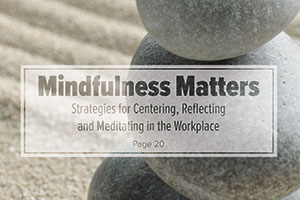Higher Ed Challenges Are Our Challenges!
To fully understand and embrace the changing role of higher ed HR, we must first acknowledge and connect our work to the most pressing challenges of our institutions.
At CUPA-HR’s national board of directors meeting in July, we asked the board to identify the most pressing challenges their colleges and universities face. We asked the same question to our four region boards in September. Here are the summarized responses of the nine most pressing challenges institutions face and action steps you, as HR professionals, can take toward overcoming them:
The 2025 enrollment cliff is already impacting many campuses across the country, and the number of traditional-aged students will continue to decline. As unemployment remains relatively low in most parts of the country, fewer people are choosing to go to college or return to complete a certificate or diploma program.
Action: I encourage you to read the feature article on this topic, “The Looming Higher Ed Enrollment Cliff” from the fall 2019 issue of CUPA-HR’s Higher Ed HR Magazine.
Affordability and access are at the forefront of campus leaders’ minds. Tuition discounts and student debt create challenges for the institution and for our students.
Action: Do you know what your tuition discount rate is? How is this impacting admissions, financial aid and your accounting colleagues?
Higher ed institutions do an insufficient job of creating and sustaining a leadership pipeline. According to the 2019 CUPA-HR Administrators in Higher Education Annual Report, the median age of presidents is 61; the median age of provosts is 59; the median age of deans is 58; and the median age of associate deans is 56.
Action: When these positions become vacant, will you need to consider external applicants? Why aren’t there internal applicants? What positions have the highest turnover on your campus? Why do these positions have the highest turnover? Which positions are hardest to fill?
Student mental health challenges are impacting our student affairs staff.
Action: When was the last time you asked your student affairs colleagues how they were doing? I encourage you to read the feature article “Destigmatizing Mental Health on Campus: What Can HR Do?” on page 32 in this issue of the magazine.
Campus climate should be a priority for everyone. We see challenging issues unfold almost daily for our students, faculty and staff.
Action: Where are the toxic and unproductive subcultures on your campus? How can you use this knowledge to create the change that needs to occur? Read “Leading With Kindness: Characteristics of Caring Work Cultures” on page 14 in this issue of the magazine to get started.
Public perception of higher ed is often unfavorable, but we know its value and importance.
Action: How do we, as higher ed HR leaders, find our voice to support the work of our institutions?
Political pressures at the national, state and local level have never been greater.
Action: How do you stay up to date regarding changing laws and regulations so that you can advocate on behalf of your institution?
Lack of adequate financial resources continues to be a tremendous challenge.
Action: How can you use workforce data and knowledge of the important work occurring across campus to ensure employees are adequately compensated and rewarded?
Title IX reporting and review procedures are under the microscope. Who knows what new Title IX regulations could be published before this issue of the magazine reaches you!
Action: Stay tuned for updates and webinars from CUPA-HR as soon as new regulations are published.
The bottom line is that our HR roles must change and evolve to meet and anticipate the needs of the campus community. There is no such thing as “just a benefits specialist” or “just a compensation specialist.” Every role must be connected to the greater challenges of the entire organization, or we risk becoming obsolete or irrelevant as the world continues to rapidly change around us.
The winter 2019-20 issue of CUPA-HR’s Higher Ed HR Magazine covers different areas of well-being, including mindfulness in the workplace, HR’s role in destigmatizing mental health on campus, well-rounded wellness programs, characteristics of caring work cultures and how on-campus childcare can help build a better work-life balance. Look for your hard copy in your mailbox, or read the issue online.



